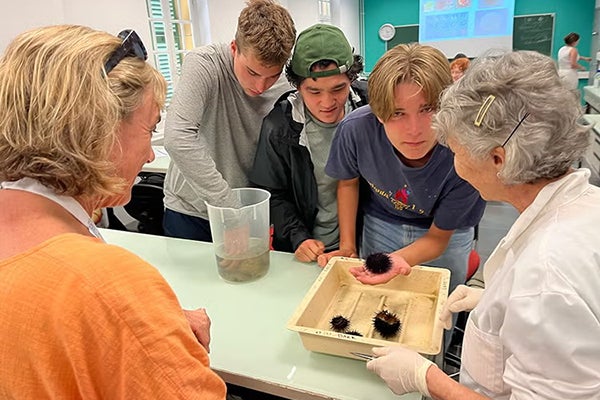After Fire Damages Stengl Lost Pines, Scientists Say Discovery Will Rise from the Ashes
More than two-thirds of the Stengl Lost Pines Biological Station (SLP), which was home to forests, savannah, and wildlife inhabitants, burned in a fire.

College of Natural Sciences staff research scientist and resident manager and volunteer firefighter Steven Gibson coordinates with firefighters at Stengl Lost Pines BIological Stations during the response effort to the Pine Pond Fire. Credit: Larry Gilbert.
SMITHVILLE, Texas – At a site where scientists have been conducting research for decades, the recent Pine Pond Fire in Bastrop County damaged outdoor habitats within The University of Texas at Austin's Stengl Lost Pines Biological Station (SLP). No one was hurt and no buildings burned in the fire.
Longstanding forests, nearby savannah and their wildlife inhabitants sustained damage at a site that had previously been spared the worst from much larger nearby fires occurring in 2011, 2009 and 2015. Until recently, Stengl Lost Pines had been home to the largest continuous patch of what are called the Lost Pines, loblolly and short leaf pines stretching across the South to this, their most western outpost. The site, which includes some of the last remaining stands of old-growth pines, provided a refuge for species of birds, insects, mammals and aquatic animals that had lost habitat to earlier fires, where field station researchers and students learned about these species and their relationship to their unique Texas ecosystem.
"More than two-thirds of the 500-plus acres that make up Stengl Lost Pines burned in this fire, leaving behind a patchwork of habitat that varies from unburned to lightly burned to little more than ashes where towering trees once stood," said Larry Gilbert, professor of integrative biology and director of Brackenridge Field Laboratory and Stengl Lost Pines Biological Station. "Despite that, there is scientific opportunity ahead. As researchers study the ecological impact of this fire for years to come, our community of scientists and students will build from the ashes. We are assembling a user group to develop a hundred-year plan for studying post-fire recovery under future climate and habitat-disturbance scenarios."
Ignited on Aug. 11, the Pine Pond Fire burned through heavy brush and mature pine alike. Bastrop County's Office of Emergency Management coordinated a response involving as many as 150 firefighters at a time from across Texas and from other states. They worked 10 days to fully contain the blaze.The cause of the Pine Pond Fire and an earlier, seven-acre fire ignited early in August, the Midnight Fire, remain undetermined.
"We appreciate the 30 different organizations and entities that contributed to the response effort, and especially are grateful to the firefighters whose tireless work helped to limit the damage at this valuable natural oasis," said David Hillis, director of the UT Austin Biodiversity Center, which houses the Texas Field Station Network that includes Stengl Lost Pines.


Photos taken before and after the fire near JD Creek at Stengl Lost Pines Biological Station. At top, Professor Larry Gilbert's field ecology pays a visit to the field station earlier in the year, before the fire. In the lower image, after the fire, embers remain near the creek. Credit: Larry Gilbert.
UT alumna Lorraine "Casey" Stengl donated land to establish the field station in 1991, providing a roughly 200-acre tract in the first-ever land gift to UT Austin for the specific purpose of biological research. She later donated 370 additional acres of adjacent property in 2015 and established the largest endowment in the history of UT Austin's College of Natural Sciences, which supports the field station and excellence in research and education in life sciences at the university.
"We are fortunate that prior to her death, Casey Stengl had the foresight to provide discretionary funding to the field station staff to support the work of students to conduct biotic and soil surveys that now provide invaluable pre-fire baseline data for future students and researchers, making SLP a signature site for such study going forward," Gilbert said.
Academic activities at Stengl Lost Pines are suspended at the site, but scientists who had active projects are able to coordinate visits to the property to assess the impact of the fire on their work. Classes that had planned to visit the site are being invited to visit other UT Austin field stations until Stengl Lost Pines reopens for learning.
Members of the public who wish to support Stengl Lost Pines research and education may make a donation.
The College of Natural Sciences and UT Austin wish to thank the numerous organizations and entities that assisted with the emergency including: Heart of Pines Fire Department, Bastrop County Emergency Services District 1, Bastrop County Fire Department, Smithville Volunteer Fire Department, Texas A&M Forest Service (strike team and air access), Texas Military Department, strike teams from the Texas Intrastate Fire Mutual Aid System, Interagency Hotshot Crew from the Bureau of Land Management, U.S. Forest Service, Texas Parks and Wildlife Department, McDade Volunteer Fire Department, Elgin Fire Department, Bastrop County First Responder Organization, Bastrop County Sheriff's Office, Acadian Ambulance Services, Bastrop County First Responders, Texas Department of Public Safety, Lower Colorado River Authority, City of Bastrop, City of Smithville, Bastrop County Long Term Recovery Team, Bastrop County Information Technology (GIS Services and Drone Team), Bastrop County Animal Services, Texas A&M Agrilife, Bastrop County Office of Emergency Management, Bastrop County Judge's Office, Texas Division of Emergency Management and Bastrop County Community Emergency Response Team. Special thanks to Steven Gibson of the Department of Integrative Biology, who went above and beyond at Stengl Lost Pines, including in service as a volunteer firefighter.



